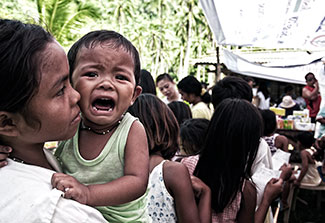Fogarty-led effort seeks to inform humanitarian care
November / December 2019 | Volume 18, Number 6

© 2012 Jundio Salvador, Courtesy of Photoshare
A team of doctors and volunteers provides medical care to
flood victims of the Sendong Typhoon in the Philippines.
Armed conflict, forced displacement, natural disasters and disease outbreaks affect more people today than at any point in recorded history. Yet the evidence base that informs how humanitarian organizations respond to these crises is weak, according to
Health research in humanitarian crises: an urgent global imperative, an article published recently in the
BMJ Global Health. The study is the result of consultations and a workshop organized by Fogarty’s Center for Global Health Studies, as part of its project titled
Advancing Health Research in Humanitarian Crises.
In all, about 180 experts from 80 organizations contributed to the effort - co-authored by George Washington University’s Dr. Brandon A. Kohrt, American University of Beirut’s Dr. Iman Nuwayhid and Fogarty staff - that lays out four key messages.
First, humanitarian health is integral to global health. “Developing global health strategies without significant attention to the humanitarian context is like building a hospital without an emergency room,” the authors noted.
Resources, Tools and Networks for Humanitarian Health Researchers
-
Evidence Aid - A collection of systematic reviews that provide reliable, up-to-date evidence on interventions that might be considered in the context of natural disasters and other major healthcare emergencies.
- United Nations (UN) International Organization for Migration (IOM)
Global Migration, Health and Development Research Initiative (MHADRI) - A global alliance of migration health researchers and scholars and a platform to share, collaborate, develop, advocate and disseminate research at the nexus of health and migration.
-
Medecins Sans Frontieres (MSF) Field research - A free repository of articles based on the field research of MSF.
-
National Institutes of Health (NIH) National Library of Medicine Disaster Lit Database for Disaster Medicine and Public Health - A free collection of disaster medicine and public health documents.
-
NIH National Institute of Environmental Health Sciences and National Library of Medicine Disaster Research Response (DR2) - A collection of data collection tools, research protocols, disaster research news and events, and more.
-
UN Office for the Coordination of Humanitarian Affairs (OCHA) The Humanitarian Data Exchange - An open platform for sharing data across crises and organisations.
-
Post-Research Ethics Analysis (PREA) - A research project investigating ethical issues in health research in humanitarian crises. It aims to identify good ethical practice from lessons learned in the field and develop a tool that assists reflection on ethical issues in humanitarian research.
-
Nuffield Council on Bioethics Research in global health emergencies - A project exploring how research may be conducted ethically in global health emergencies.
-
Elrha Research for Health in Humanitarian Crises (R2HC) - A research funding programme specific to health research in humanitarian crises, funded by the UK Department for International Development, UK National Institute for Health Research, and the Wellcome Trust.
Source: Table 2, Selected resources, tools and networks available to humanitarian health researchers,
Health research in humanitarian crises: an urgent global imperative,
BMJ Global Health, November 11, 2019
If health in fragile contexts is not prioritized, it will be very difficult to achieve the
UN’s Sustainable Development Goals (SDGs), such as the pledge to ensure healthy lives and promote well-being for all ages. Children in conflict-affected areas are twice as likely to die before age 5, compared with those in other, more stable low- and middle-income countries (LMICs), the authors observed. Infectious diseases are more difficult to manage in conflict settings, such as the current Ebola outbreak in the Democratic Republic of Congo, recent cholera outbreak in Yemen, and stalled efforts to eradicate polio in sections of Afghanistan, Pakistan and Nigeria.
In addition, there are unique and important scientific questions that can only be answered through research in humanitarian settings, the authors said. For example, research can help determine which interventions are most effective, if new or adapted solutions are needed, and how best to deliver care in crisis settings. Yet, the quantity and quality of relevant evidence is lacking. “Research is not typically perceived as a priority when immediate survival needs of populations need to be funded and administered,” according to the authors. The absence of evidence-based practices in humanitarian crises leads to a reliance on research findings from stable settings, which may not be relevant in situations “where health systems may be damaged, infrastructure is weakened and populations have experienced exceptional trauma.”
A number of principles generally apply to research in humanitarian crises, the authors suggested. Investigators should use flexible and adaptive methodologies, form partnerships with humanitarian actors such as local governments and nongovernmental organizations (NGOs), engage with affected populations and leaders, build research capacity, collaborate among disciplines, and leverage existing tools and networks.
The publication also laid out 22 humanitarian health research questions and provided a directory of relevant online resources, tools and networks that are available to researchers.
While there are limited research funding opportunities specific to humanitarian crises, the authors found some cause for optimism. Awareness of the need for evidence in humanitarian health is growing, humanitarian NGOs are strengthening their internal research capacities and deepening relationships with academic experts, and a number have established programs that include research activities.
Still, the needs remain formidable. “Humanitarian health should be recognized as a key research priority and integral to progress in global health, not an outlier,” the authors concluded. “Without this, we will never be able to comprehensively address high-burden global health needs nor achieve the ambitious SDGs.”
More Information
To view Adobe PDF files,
download current, free accessible plug-ins from Adobe's website.